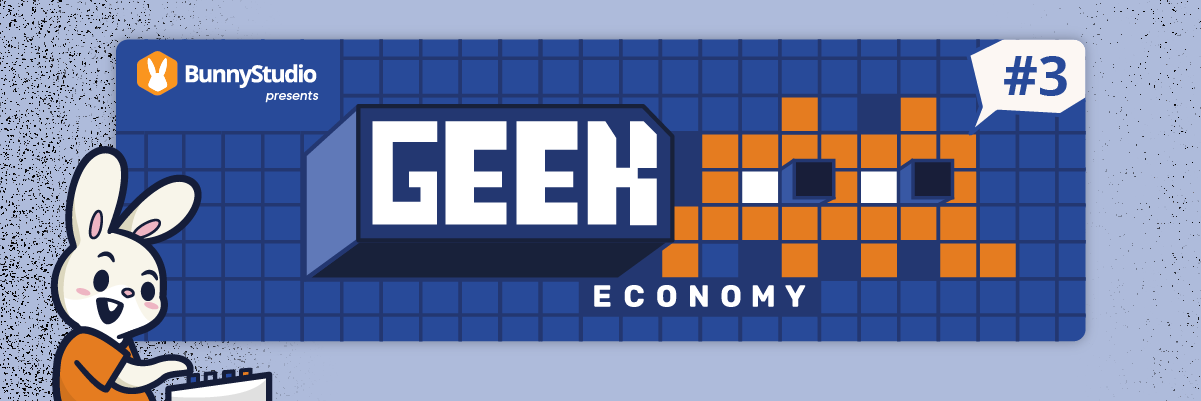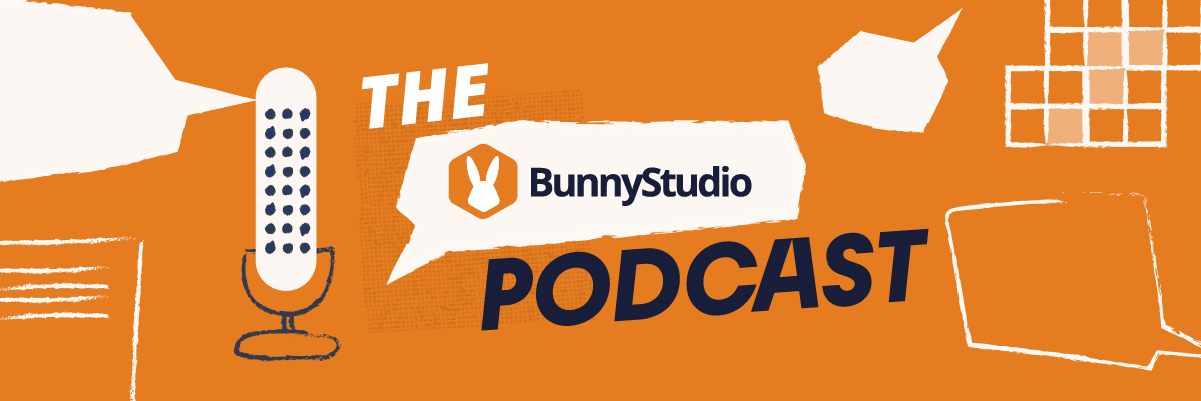— PROLOGUE —
Kristen:
One thing you’ll always hear from people who work in the gaming industry is that it’s a tough gig.
Hope Fan:
Human resources is probably one of the toughest parts of any business, uh, as to find the right people.
Kristen:
And for big-time publishers, making a game can cost millions – tens of millions, or hundreds of millions of dollars.
But the reward can be worth it – the video game industry is worth almost $160 billion US dollars And it’s projected to hit over 200 billion by 2023. There are no guarantees though. Even the most talented and hard-working struggle and most projects fail to break even.
Daniel:
I found that if the projects are long or they’re incredibly tiring it’s hard. It’s hard to go from one to another.
Kristen:
So you can imagine how hard it is for smaller developers new on the scene looking to compete with the big dogs It’s obvious that if they don’t have something special up their sleeve they can forget about competing.
Josh:
Independent studios will never be able to, you know, match them pound for pound in terms of money technology, and manpower. And the developers who do try to do that usually end up with either a game that is like a shell. All that major experience or in some cases it just never gets out the door.
Kristen:
The ace for many smart developers has been the gig economy In 2019 video game workers identifying as self-employed contractors or freelancers were reported to make up over 25% of a game’s human resource production budget.
So, if a game cost one million dollars to make, two hundred and fifty thousand dollars of that went to workers in the gig economy!
In this episode, we’re talking to industry insiders about what it takes to make it in this new economy.. and where the opportunities lie.
But first, we need to ask the biggest question devs ask themselves when they go down this game’s path….
— INTRO —
Hey. I’m Kristen Di Mercurio.
I’m an actress, singer, and voice-over artist… My entertainment work is split across a stack of projects…. many clients… and a lot of it done over the web.
More and more, workers and industries are shifting to this type of model; specialized skills – individual jobs… And more and more, the gig economy is changing how we think about employment.
That’s why I’m so excited to bring you this podcast. As more jobs go online GEEK ECONOMY will help guide you through…. We’ll explore freelancing, marketplaces, and the future of work.
We’ll also show you how the gig economy will change our lives and our culture.
Geek Economy is brought to you by Bunny Studio. Trusted by more than 50,000 companies every year, Bunny Studio helps businesses scale their creative needs with a vetted crowd of freelancers.
— ACT ONE —
Kristen:
So when we asked a bunch of people about their favorite video games – the ones they remember most…. there was something about their answers that stuck out….
Hope Fan:
Actually, I would say the first games I played were when I was around eight or nine years old, I played the early ‘Command and Conquer’ games, ‘Red Alert’, which were super popular RTS games back in the nineties, like me and my friends used to go, have these lan parties basically –
Kristen:
Lan parties. Oh my goodness.
Hope Fan:
Yeah. Yeah. Yeah, we were geeking out here.
Emma:
And mainly just played the Crash Bandicoot games, those like free classic ones. And I was just so hooked. That was my number one hobby all the time, I’d play with my sister, was objectively better than her at Crash Team Racing, which is one of my favorite games now, thank you for the remaster.
Kristen:
The thing they all had in common was that they weren’t just good games, they were good games with iconic developers. Nintendo, LucasArts, Naughty Dog, these are developers that understand the importance of their voice, their identity, and their brand.
Daniel:
When I was a kid, it would have been the Jedi Knight series. It’s a LucasArts game from around ’95, ’96. And that was one of my first shooter games that I got to play. Cause I grew up in a somewhat religious household and Star Wars was cool, so I could play Star Wars and I just sat down and was just so happy that I could be a Jedi in the Star Wars universe. And, like, cut limbs off of people and stuff. And it- it was so much fun.
I’m going to plead over the internet right now with, whoever is making the next Star Wars game that just remake, just remake Jedi Knight. That’s fine. Just remake it. I’ll buy it.
Kristen:
Just bring it back, we’re in the age of nostalgia right now. That’s what we’re all clinging to in the times of COVID. I think it would do very well. You know?
Daniel:
Yeah. I mean, I’ll buy all the copies.
Kristen:
You will personally keep the game afloat.
Daniel:
I will do that.
Kristen:
Nintendo is a classic example of this. In 2016, the Wii U’s sales were way down… to the tune of a 49 million dollar operation loss. Esteemed business analysts argued (Nintendo?) should be sold off to the highest bidder, that its games should be sold on the open market, and they should make a run for mobile apps. They thought the company would make more money with micro-transactions… by selling Mario on the PlayStation rather than trying to sell kids a Nintendo 3DS in a world full of iPhones.
Josh:
I started playing video games back in 1988, which seems like a very, very long time ago. And my very first game was Super Mario Brothers and, I’ve always resonated or really enjoyed action, heavy games. I would say always have had a soft spot for Nintendo.
Kristen:
A few months later, Nintendo released the SWITCH. They sold 2.74 million copies in the first month, making it one of the fastest-selling game consoles ever. What those business commentators couldn’t understand is that the power of the Nintendo brand is so much more valuable than they could ever imagine… To be ‘Nintendo’ means a standard of care and dedication.. and it took decades to build that trust.
Josh:
One of the reasons why I fell in love with Nintendo and then that kind of grew into loving another company, FromSoftware Inc, on the rise of Demon Souls and the Dark Souls franchise, was that just real commitment to making the mechanics kind of speak for themselves.
Kristen:
Josh Brycer is a writer, YouTuber, and game critic for the website, ‘Game Wisdom’. He explained some of the small but special things Nintendo does in their games….some things you notice, others you don’t. It’s this attention to detail that helped create an immense level of brand loyalty…
Josh:
Nintendo’s never really been, you know, a very high-level developer when it comes to the storytelling side, but they do really well in terms of making their gameplay and the mechanics feel right in your hands. One of my recent examples would be something like The Legend of Zelda: Breath of the Wild, which just like blew me away in terms of what Nintendo could do in that space.
And whenever they kind of, you know, go out of their comfort zone or they try a different kind of genre or design, it usually ends up being either a very polished or very well done version of that or something so different than you just can’t help, but, you know, marvel at what they made.
Kristen:
So for Nintendo – with decades of experience, brand loyalty, and market share – the goal is to build on their success. To continue to meet the promises they’ve set and audience expectations. But where is the opportunity for smaller, emerging developers? How could they stand a chance against a Goliath like Nintendo? Find out after the break…
Hey! If you’re liking what you hear and you have a minute, please subscribe, rate, and review on whatever app you’re using to listen. We are on Apple Podcast, Spotify, Google Podcasts, Amazon, and more! This helps us get the word out to other people so they can learn a bit more about how important the Gig Economy is for everyone. Thanks for listening.
— ACT TWO —
Kristen:
The thing about a lot of the classic, nostalgic video games is that they can get repetitive and bland in later versions. Video game connoisseur, Emma Barrett Brown has a theory…
Emma:
I think a lot of games kind of stick to the same monotonous formula because it sort of works and there’s a brand, there’s a game that they’re selling that works for them and it is popular with people these big brands wouldn’t still be selling, like, for example, Call of Duty. If people weren’t coming back to buy them every time, and obviously what is working there, what is happening there works for a lot of people.
Kristen:
The big developers are inclined to play it safe – they have a lot to lose! This leaves indie and smaller game publishers and developers a lot of headroom to innovate and test new ideas.
They’re also more nimble and have less to lose so they can take a chance on a more creative game. This is the opportunity for indie developers on paper… When it comes to execution – how developers will build a product with limited budgets and resources -…. the answer is the gig economy.
Hope Fan:
Another point on that I think is just the economic aspect because, traditionally, you know, if you were hiring, if you were a tech company hiring top talent in the US, whatever, you’d go to like San Francisco or Austin and the talent would be quite expensive.
Kristen:
This is Hope Fan. He’s the Chief Marketing Officer at Pixelmatic, an exciting new studio based in Shanghai.
Hope Fan:
But now with the gig economy, with hiring workers online, you can find very talented people who live in less expensive places who are probably quite a bit cheaper. Although I think that gap is going to close over time as well because once people are used to, you know, hiring talent from all over the world and these talents recognize that they can get the same money from American companies, I think the gap between different salaries going to close as well.
I mean, COVID, I think helped a lot of people open their eyes to what our world is going to be, going forward. I mean, some of the big tech companies like Twitter and Shopify, for example, they realized that they didn’t actually need to have offices anymore. So they, they’ve gone full remote, right? Because they’re able to establish a system that allows their teams who work very efficiently, without being together in one place physically.
So, I definitely, I think, this is going to become more and more common going forward, especially for companies that don’t actually require physical presence. You know, if we’re not a distribution center or a warehouse or something like that, there’s no need for having a physical office in many cases.
And then, like I said earlier, sometimes it takes time or it’s difficult to find a full-time employee in a short amount of time. So you start with freelancers and then sometimes freelancers might become permanent employees. Or sometimes you just take more time to find someone permanent, but freelancers would definitely have a bigger and bigger role and greater demand.
Kristen:
The other thing Hope uses freelancers for at his company are these tricky niche tasks.
Hope Fan:
I think we definitely go for very niche skilled workers. But then again, I mean, our industry also, it’s uh, when it comes to the technical side of things, things are very niche. Right? Like you need, you need to be familiar with the software you need to have experience doing these one or two things.
We don’t really hire like, digital marketing freelancers or something like that, who have like, a list of things in their resume, right? SEO, SEM, making audios, videos, whatever, all these things. For us. it’s- we’re going out for way more specific skills.
Kristen:
More like sharpened, honed, like, tip-of-the-point situation.
Hope Fan:
Yeah, exactly. Because, cause most of the time when we’re using freelancers is- it’s for one or two very particular tasks. You need people who have very particular skills for those particular tasks and not much else, that’s it.
Kristen:
Hope’s currently developing a new title called Infinite Fleet. Not only is it a science fiction online multiplayer game, but it also incorporates blockchain technology into the in-game currency system. This is something no game has ever done at this scale. And that’s the great thing about the gig economy.
Hope can hire people to perform the little niche tasks he needs…. he’s able to make something which doesn’t just compete with the big studios, but actually innovate and put something totally original out into the world.
— ACT THREE —
Kristen:
So what’s the catch with gig economy and games? One challenge is culture – how to create it or maintain it in a small amount of time across (possibly) multiple timezones.
Game developers need a cohesive sense of identity – remember, the work is tough, even at the best of times…
Daniel:
Cause I’ve, I’ve worked on that share of projects too. It becomes a struggle and it can turn into fights and that can get pretty ugly, as I have experienced.
Kristen:
That’s Daniel Rose.
Daniel:
I’m Daniel Rose, I tend to go by Dan, so feel free to call me that. I am, presently, an assistant teaching professor in the Digital Media department at Drexel University.
I teach and mentor students on a variety of topics, but most of it centers on game art and it’s mostly focused around environments or aspects of environment art. And prior to that, I spent a lot of time working as a freelancer and a contractor for game studios or other entertainment companies.
Kristen:
Dan’s run into this problem…. among different freelancers, experience levels differ and people aren’t on the same wavelength. As a result, the product suffers.
Daniel:
Some games are going to, we’re going to crunch. We’re going to, we’re going to push through and smooth everything out in this, like, year-long death march or something, or six-month death march or whatever you want to call it. Other projects you- maybe that’s what’s- maybe that’s tried. Maybe they decide it’s just something that’s not going to work and they just put it out there.
Experiences I’ve personally had, they’ve honestly been a little disjointed. But nothing that’s like, been an absolute disaster, possibly save one title.
Kristen:
But despite all of this, Daniel still thinks that the gig economy is the best way forward for developers and studios alike.
Daniel:
I think it actually lends itself pretty well to that. I was mostly teleworking to some degree before COVID, so none of this is super new to me. There’s a handful of independent games that have been built completely remotely.
There’s a game called I-may, they may have changed since they shipped the first game- but ‘Ori and The Blind Forest’ I believe was built completely remotely, small team. And that game did phenomenally well, it’s got this beautiful aesthetic to it. And I think that is proof that at least on the small team’s side, you can absolutely create something that, you know, resonates with people, both artistically, aesthetically, and just, you know, as a strict, ‘Oh, this is like a cool technical piece of like, art.’ Large games? We’re going to find that out. I can’t answer that.
Kristen:
We don’t know yet. So we’re faced with a new problem here. But Daniel and Hope both agree that at the end of the day, the solution to that problem is that classic challenge all teams have faced from day one: communication.
Hope Fan:
It is very challenging, I would say. Uh, there are so many moving parts to sort out, to organize, and to sort of get everyone on the same page.
I think the key to that is just having very strong operations and productions team. So we have, you know, we have a couple of producers who are very much at the heart of everything, and they, you know, they’re making sure that everything is running cohesively in different departments, on different aspects.
They’re running the scrums for the tech team. They’re coordinating with the art team and the design and everything. So there’s obviously there’s going to be a lot of regular meetings as well, that’s, you know. I mean meetings, sometimes they take up a lot of time, but you know, it’s necessary.
I think in our company at Pixelmatic, we have a pretty efficient system set up.
We communicate with freelancers, mostly on Slack. We always have their individual channels set up, we’ll invite them in as single-channel guests, whatever, and we always have a dedicated operations person who sort of manages them all. So, I think we have a really good workflow in place.
— OUTRO —
Thanks for listening to Geek Economy: The show that helps you understand how the gig economy is changing our lives and our culture.
Geek Economy is brought to you by Bunny Studio. Trusted by more than 50,000 companies every year, Bunny Studio helps businesses scale their creative needs with a vetted crowd of freelancers.
Find great video creators, voice over artists, designers, writers, and more at bunny studio dot com slash geek economy offer. The link is on the show notes.
If you liked this episode, please share this with someone that would find this of interest. And while you’re at it don’t forget to subscribe, rate, and review on whatever app you use to listen.
Enjoy the show? It’d mean the world to us if you follow us on Podcast on Spotify, or your preferred app!
Credits
This episode was produced in collaboration with Bunny Studio and Pod Paste in Sydney, Australia.
- Executive Produced by Daren Lake
- Written and Produced by Aidan Molins
- Audio Production, Sound Design, and Engineering by Aemyn Connolly,
- Podcast management by Michelle Le
- Supervising Editor – Mike Williams
- Assistant Storywriter – Charles Montano
You can check out all of our amazing guests online who helped make this episode great:
- Hope Fan, Chief Marketing Officer at Pixelmatic
- Emma Brown Beresford, video game connoisseur
- Daniel Rose, Digital Media Professor at Drexel Uni
- Josh, writer, YouTuber, and game critic at Game Wisdom













